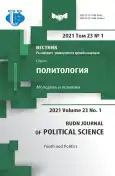Reinforcement Theory and Study of the Impact of Internet Technologies on Political Participation of Modern Youth
- Autores: Grishin N.V.1
-
Afiliações:
- Saint Petersburg State University
- Edição: Volume 23, Nº 1 (2021): Youth and Politics
- Páginas: 47-59
- Seção: YOUTH IN POLITICS
- URL: https://medbiosci.ru/2313-1438/article/view/322130
- DOI: https://doi.org/10.22363/2313-1438-2021-23-1-47-59
- ID: 322130
Citar
Texto integral
Resumo
The article examines the methodological possibilities of reinforcement theory in the field of studying the influence of Internet technologies on political behavior. The prospects of the “theory of reinforcement” are considered in the context of the changing role of Internet technologies in the political process since the beginning of the 2010s and the growing popularity of competing methodological directions, first of all, the “theory of mobilization”. It is revealed that the rivalry between the theory of reinforcement and the theory of mobilization at the present stage turns into a state of methodological dualism. Reinforcement theory not only retained its significance in the context of the growth of political mobilization in the period of the 2010s, but also received further development: the new concept of “selective avoidance” supplemented its theoretical apparatus. Reinforcement theory retains its significance for the study of political leadership among Russian youth, the activities of radical youth organizations. One of the factors in preserving the methodological potential of reinforcement theory in the study of the political activism of Russian youth is the practical combination of its principles with the network approach.
Palavras-chave
Sobre autores
Nikolay Grishin
Saint Petersburg State University
Autor responsável pela correspondência
Email: nvgrishin@mail.ru
Doctor of Political Science, Professor of the Department of Political Institutions and Applied Political Studies
Saint Petersburg, Russian FederationBibliografia
- Baringhorst, S. (2008). The political empowerment of citizen consumers – opportunities and problems of anti-corporate campaigning on the net. In T. Häyhtiö & J. Rinne (Eds.), Net working/networking: Citizen initiated Internet politics. Tampere: Tampere University Press (pp. 281–309).
- Best, S. J., & Krueger, B. S. (2005). Analyzing the representativeness of Internet political participation. Political Behavior, 27(2), 183–216.
- Choi, Y.-T., & Kwon, G.-H. (2019). New forms of citizen participation using SNS: An empirical approach. Quality & Quantity, 53, 1–17.
- Davis, R. (2009). Typing Politics: The Role of Blogs in American Politics. New York: Oxford University Press.
- Filatova, O. G. (2014). Internet technologies of political mobilization in modern Russia. Political expertise: POLITEX, 4, 57–67. (In Russian).
- Jensen, M. J., Danziger, J. N., & Venkatesh, A. (2007). Civil society and cyber society: The role of the Internet in community associations and democratic politics. The Information Society, 23(1), 39–50.
- Kroh, M. & Neiss, H. (2012). On the causal nature of the relationship between internet access and political engagement: Evidence from German panel data. In E. Anduiza, M. J. Jensen & L. Jorba (Eds.), Digital Media and Political Engagement Worldwide: A Comparative Study. New York: Cambridge University Press.
- Kurochkin, A. V. (2012). Social networks as a tool of political mobilization: the danger of manipulation and the limits of democracy. Political expertise: POLITEX, 8(3): 200–207. (In Russian).
- Lazarsfeld, P. F., Berelson, B., & Gaudet, H. (1944). The People’s Choice: How the Voter Makes up his Mind in a Presidential Campaign. New York, Columbia University Press.
- Lunat, Z. (2008). The Internet and the public sphere: Evidence from civil society in developing countries. The Electronic Journal of Information Systems in Developing Countries, 35(3), 1–12.
- MacDonald, J., & Tolbert, C. (2008). Something rich and strange: Participation, engagement, and the tempest of online politics. In K. Yang & E. Bergrud (Eds.), Civic Engagement in a Network Society. Charlotte, NC: Information Age Publishing (pp. 271–298).
- Martyanov, D. S., Lagutin, O. V. & Budko, D. A. (2017). From freedom to order on the Internet: What do Russians think? Sociodynamics, 1, 39–50. (In Russian).
- McLeod, D. M., Kosicki, G. M., & McLeod, J. M. (2002). Resurveying the boundaries of political communications effects. In J. Bryant & D. Zillman (Eds.), Media Effects: Advances in Theory and Research. Mahwah, N.J: Lawrence Erlbaum Associates (pp. 215–267).
- Nam, T. (2012). Dual effects of the internet on political activism: Reinforcing and mobilizing. Government Information Quarterly, 29, 90–97.
- Popova, O. V., & Lagutin, O. V. (2019). Political views of the youth: Loyalty or protest? RUDN Journal of Political Science, 21(4), 599–619. (In Russian). doi: 10.22363/2313-1438-2019-21-4-599-619
- Popova, O. V. (2019). Priority sources of political information and political practices of Russian youth. Political Space and Social Time: Truth and Lies in Politics and Arts, 191–200. (In Russian).
- Salter, L. (2004). Structure and forms of use: A contribution to understanding the “effects” of the Internet on deliberative democracy. Information, Communication & Society, 7(2), 185–206.
- Schlozman, K. L., Verba, S., & Brady, H. E. (2010). Weapon of the strong? Participatory inequality and the Internet. Perspectives on Politics, 8(2), 487–509.
- Sharapov, R. I. (2017). Conditions of political mobilization on the Internet. Sociodynamics, 10, 1–8. (In Russian).
- Sherstobitov, A. S. (2013). “Network publicity” as a new factor of political mobilization in modern Russia: An attempt at network analysis. Vestnik of Saint Petersburg University. International Relations, 3, 99–105. (In Russian).
- Sokolov, A. V., & Palagicheva, A. V. (2020). Mobilization and demobilization in a network political protest. Political Science, 3, 266–297. (In Russian). DOI: 10.31249 / poln / 2020.03.12
- Stanley, W. J., & Weare, C. (2004). The effect of internet use on political participation: Evidence from am agency online discussion forum. Administration & Society, 36(5), 503–527.
- Strandberg, K., & Carlson, T. (2016). Expanding the online political demos but maintaining the status quo? Internet and social media use by Finnish voters prior to elections, 2003-15. Scandinavian Political Studies, 40(1), 82–106.
- Vissers, S., & Stolle, D. (2013). The Internet and new modes of political participation: Online versus offline participation. Information, Communication & Society, 17(8), 937–955.
- Zhu, Q., Skoric, M., & Shen, S. (2017). I shield myself from thee: Selective avoidance on social media during political protests. Political Communication, 34(1), 112–131.
Arquivos suplementares









